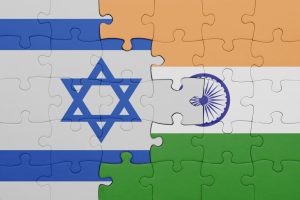When U.N. peacekeepers stationed in Lebanon came under fire as Israel struck the country, 34 countries who contributed troops to the force immediately put out a joint statement condemning the attacks on the peacekeepers. India has over 900 personnel in Lebanon as a part of the peacekeepers but did not take part in the joint statement. Instead, New Delhi “aligned itself with it” after the statement was issued.
While other governments that enjoy friendly ties with Israel have not hesitated to criticize it, what explains India’s hesitance? In a tussle between trade and defense interests in Israel, strategic and energy interests in Iran, and economic interests in the Gulf, Indian policy over the last year has reflected this multi-directional pull.
India was the first non-Arab country to recognize the Palestine Liberation Organization (PLO) as legitimate representatives of the people of Palestine in 1974 and recognized the State of Palestine a year later. It took a stance in favor of Palestine in the United Nations for decades, which was reflected in India’s U.N. votes. Indian leaders also had close ties with Yasser Arafat.
However, since the 1990s, India’s proximity to Israel has grown, too. Their policies reflect the need to balance ideological support for the Palestinian cause with India’s increasing dependence on Israeli technologies and defense infrastructure.
Consider India’s policies vis-a-vis Israel over the last year. After the Hamas attack on October 7, 2023, India expressed solidarity with Israel and its right to defend itself. Since then, India has continued to try and maintain a careful balance despite many countries calling for an immediate ceasefire for many months in light of Israel’s operations in Gaza. India publicly condemns terrorism and has called for de-escalation, fearing a broader conflict in the region, but has not outright opposed Israeli actions. An Indian national was killed on a mission with the United Nations near Rafah. A government statement expressed that India was “deeply saddened,” but did not call for an investigation or express any outcry.
Additionally, while the exact figures for India’s defense trade with Israel aren’t publicly available, there have been reports of Indian arms exports found in Gaza after Israeli strikes. Amid speculations, a video released by the Quds News Network revealed a “made in India” label in the remains of a missile used by Israel. While these exports may be negligible, it is not a good look for India’s relationship with Iran and broader engagement in the Gulf.
While one can argue that continuing to balance India’s responses in the same vein is the way forward, recent developments raise new questions. After having only made relatively restrained statements on Israel’s conduct, Saudi Arabia and the United Arab Emirates have become more vocal. Saudi Arabia took a stance against “all crimes perpetrated by Israel against the kindred Palestinian people.” The UAE publicly expressed support for the people of Lebanon.
India has a robust trade relationship with both countries, with one-sixth of India’s total trade coming from the Gulf. In addition, some of India’s largest diaspora populations reside in these countries. Consequently, it makes sense that India seems to have measured its response by the stance taken by the UAE and Saudi Arabia. If they continue to be critical, India may have to take on a more vocal role.
Further escalation between Israel and Iran will also impact India. India needs to ensure its relationship with Iran does not hinder the Chabahar Port dynamic, where India, Iran, and Afghanistan’s trade hangs in the balance. Iran also has the potential to further India’s interests concerning Pakistan. Additionally, despite relatively low energy imports currently, Iran holds the potential to be a much larger partner for India. Considering these factors, New Delhi will have to tread carefully to prevent its relationship with Tehran from deteriorating to a damaging extent.
Since Iran sent a flurry of missiles Israel’s way, Israel’s response has been measured with more limited counterstrikes. If the rest of the war is any indication, a milder response from Prime Minister Benjamin Netanyahu would be anything but characteristic, and the world awaits Israel’s full reaction. Tensions with Lebanon and Syria also show no signs of thawing and Israel is likely to continue with their strikes.
Israel does not have the capacity to maintain a constant presence in Gaza, despite having obliterated a lot of Hamas’ leadership. This may lead to a power vacuum in Gaza. The death of over 42,000 civilians in the Gaza Strip also seems to indicate a lack of any comprehensive strategy on Israel’s part, since they have gone far beyond merely dismantling Hamas. Those who survive will have witnessed the violence and turmoil firsthand, and are likely to harbor resentment toward Israel. Combined with the absence of any governing leadership, this could mean serious risks for Israel in addition to regional instability. Supposing the war continues to progress the way it has, India may have to change tack.
India has historically been flexible in its partnerships, making choices in relation to the ebb and flow of regimes. The same way India cemented ties with Israel when it was in their interests, the tide may be shifting. While India is unlikely to be able to drastically alter its relationship with Israel overnight, it could be beneficial to abstain from high-profile engagements with Israel for the time being. The next several months are likely to shape the choices India makes regarding its policies on West Asia for the coming years. It is a pivotal time for West Asia, India, and the world.

































